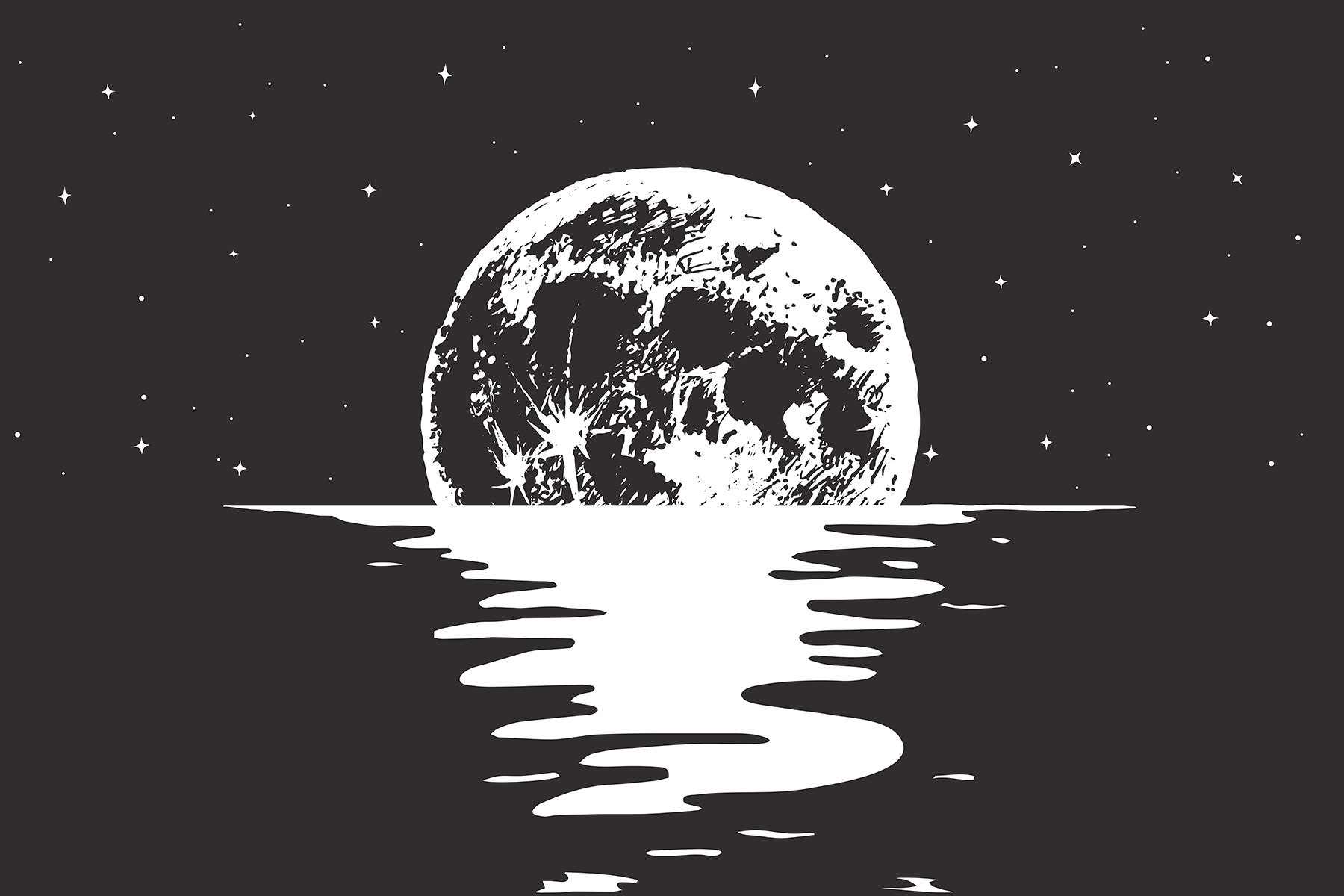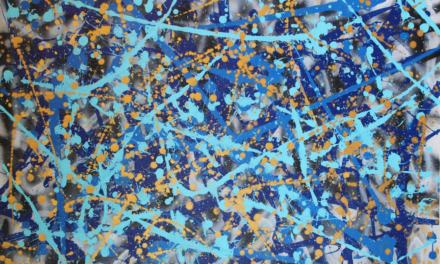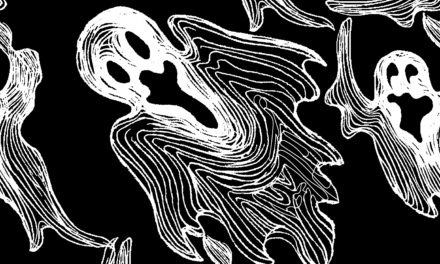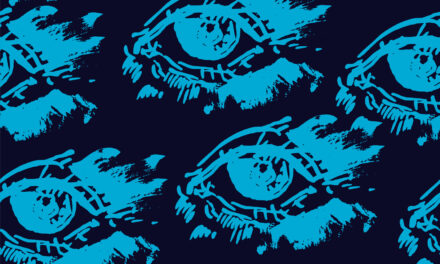Everything Merges with the Night
by Nathan Alling Long
Issue 3: Knowledge | 4,320 words

for a certain Vodnik
“Where are we going now?” I ask my friend as we climb a grassy knoll on the edge of his city. The thick night fog smells of brine. In the distance, tall buildings cast off a milky glow, offering dim impressions of themselves.
“There’s this shed,” Taro says.
“What’s there?” I ask.
“Someone,” Taro says.
I arrived here at noon, after two days traveling by train. We’ve been walking ever since, and it’s now far past midnight. I’m tired, though
“No name,” Taro says, lighting a cigarette, “but I call him Troll.”
I smile. Taro used to do this kind of thing all the time—play tricks, surprise me. From the corner of my eye, I see soft light from a window of a far-off building, which seems to rise and fall as we walk, like a lantern at the bow of a ship, plowing through the fog. The whole world seems without
“Troll is shy,” Taro says. “He’s also dangerous. But if you stay calm and listen to what he wants, he won’t hurt you. He can even help you out.” Taro’s lips glow with excitement.
I look at him, his hair tangling about his face, like lines of words trying to arrange themselves into sentences. We are both in our twenties, but in this
“This will be good,” Taro says, exhaling smoke. “Unless, of course, it’s not. There’s always that possibility.”
••••
We first met when we were five, in the woods between his house and mine, where we began to dig a hole through the Earth with sticks, trying to reach the other side. We did this for hours, even after the light drained from the sky.
When our parents found us, they snatched us up and took us each home; there was no separating us after that. But we’ve both traveled far apart and it’s been almost three years now since we last saw each other, the longest time we’ve spent apart.
We hold hands as we walk, and as we reach the top of the knoll, the city itself, which was loud and towering during the day, seems now to be only a distant fire, glowing out of reach. We have not eaten all day, but I don’t care. I breathe in the wet air, satisfied.
As if he has read my mind, Taro says, “You’ll think more clearly without food. Troll likes that.”
I laugh, shake my head.
Taro lets go of my hand to light another cigarette. The match flares up in an unearthly orange, and his first breath of smoke disappears into the fog. I breathe in a thin scent of it and remember how we’d sit all night by a fire in the woods. Sometimes, we’d write secrets on scraps of paper, then throw them in the fire, daring each other to snatch one out before it turned to ash. Once, he grabbed one of my crumbled sheets. I was scared, but he threw it back in the fire without reading it. This was how much we love each other.
We help each other over a stone fence and begin walking down a road to the bottoms. The fog is thinner here, and I can see the outlines of several taller buildings now in the distance; they seem to shift above us as we curve down along the road.
To our right, a river and train tracks run under the bridge and into a tunnel; to the left, they disappear between two tall stone walls curving slowly out of sight. Taro points up to where the bridge meets the hillside, high above. “See the outline of the shed?” he asks. I nod.
“That’s where we’re heading.” Then he adds this: “Just remember, Troll is shy.”
I laugh. So shy, I think, that I will not see him.
As we make our way up, I glance at the little stone shed. I can’t imagine who would have built it or for what purpose. It looks older than the bridge itself, yet I can’t imagine how they could have built the bridge on top of it without destroying it—and why they would have bothered to preserve it. The ground around the shed is level. Behind the shed is a huge concrete slab on which the bridge rests. From below, I can’t see an entrance, so I expect we’re only going to sit next to the shed and look down on the empty ravine. Perhaps my friend has planned it so we’ll see a train. Maybe we’ll tell each other stories like we used to do, unravel the secrets we have creased inside ourselves these past few years. Perhaps, in this way, we will be each other’s troll.
When we finally reach the top, by the far trestle, Taro says, “Take off your clothes, except for your shoes.”
I stand there and laugh.
“No, I’m serious. We’re going in the water. But it’s safer to leave your shoes on.”
I can’t imagine he really means it. “What water?” I ask. “What about the troll?”
“Just Troll,’” he says, unbuttoning his shirt. “The water is inside the shed. That’s how you meet him, by jumping in the water. He would never come out of the shed.” My friend takes off his shirt and unbuckles his belt.
“You’re really going in? How do you know it’s safe?”
“I’ve done it before. Lots of times. It’s only scary the first time.” He pulls off one shoe, then the other. “Well, maybe the first couple of times.”
I start undoing my shirt, though I’m unconvinced. “How do you get in?” I ask.
“Around the back,” says Taro, as he takes off his pants and puts his shoes back on. “There’s a space between the wall and the roof—just enough room to slip in. There’s even a little metal ladder attached to the inside wall, so you can climb down into the water.”
“And to get back up,” I say, removing my shirt.
Taro tilts his head. “Well, yes,” he says, sounding uncertain, “but the point’s really to go down far, as deep into the water as you can. Troll is at the bottom, and the closer you come to him, the more he appreciates it, the better chance you have… to meet him.”
“You have to be joking,” I say, stepping back. “I mean, you start talking about a troll like it’s real and… I don’t know.”
“It’s okay,” Taro says, touching my shoulder. “The pool is deeper than any other I’ve ever dived in before, and it’s the best thing you will ever do in your life. Trust me.”
I think about a painting I once saw in a museum, a portrait, which up close seemed to only be a field of smeared color, but as I stepped back, a face became clear, the details sharper. I wonder at this moment as I stand before my
“Trust me,” he says again, but I am unsure.
I have already taken off my shirt and undershirt, and the damp air is licking my skin. I hear a deep moan
When we’re both naked, except our shoes, Taro leads me by the hand to the back of the shed. I see now that the back wall is a few feet lower and the back side of the pointy roof is missing altogether, making a triangular opening just big enough to slip into.
“Is the pool large enough for both of us at once?” I ask.
“Almost,” he says, “but we have to go down one at a time. I’ll go down first. You wait until I come back up. It’s too dangerous to have us both down there together.”
“Dangerous how?” I feel doubt rising back up my spine.
“We could hit each other,” Taro says. “And
“Okay, if you go first.”
“Yes. But you have to promise me not to go in until I’m back.”
“No problem,” I say, not wanting to go in any sooner than I have to.
“Good,” he says. Then Taro grabs hold of the ladder rail and lifts himself over the wall, landing on what must be the first rung. His back’s toward me, the strands of his long dark hair against his white skin look like tree branches, bent down by
I glance past him for a moment, over the shed roof, to look into the ravine. The river and train tracks bend to the right and disappear into the tunnel to the left. I can even see the dirt road we took down to the ravine, though it vanishes quickly in the fog.
I have only looked away for an instant, but when I turn back, Taro is gone. He has slipped under the water, it seems, without a sound. I tilt my head into the dark opening and only hear
To meet the troll, I say to myself and laugh.
“Just Troll,” I then say aloud.
It strikes me then that I am alone, naked, under a bridge in an unfamiliar city. My clothes are only feet away from me, but still, I’m startled to find myself here like this. I’m not cold, though I cannot shake the feeling that something isn’t right. I hear a low rumbling and imagine another car is crossing the bridge above. Then the loud moaning of a train whistle startles me, and I see a train’s headlight slowly
The train’s yellow headlight becomes broken glitterings on the river’s surface. Then the engine slips into the tunnel, and a screech of breaks cascades down the line of cars. Though it slows, the cars keep passing under the bridge and into the tunnel. I watch at least a dozen pass before I think to look back into the shed for Taro.
When I do, he still hasn’t come up. I’ve been standing within a foot of the entrance, so he couldn’t have slipped out, even if he had been absolutely silent. I stick my head into
At the time, I had only been thinking of what might happen to me. After all, Taro had said that he had done this many times—though how many, I don’t exactly remember.
I pull myself out of the shed and look back at the train, which is still rumbling and screeching forward. There’s no end of it in sight. I try to calculate how much time has already passed from when he went under, but I can’t tell exactly. Thirty seconds? Forty? A full minute? By the time the train has completely entered the tunnel, I figure he has to come back up. No one could hold his breath as long as that.
I count each boxcar now, trying to calm my thoughts and heart. When I’ve reached seventy, I duck back into the shed.
Still no sign of Taro. I would call out for him again, but the sound of my own voice, the sound of his name, is too unsettling to hear. I’m wondering, Should I go in?
If he’s dead, whatever killed him could as easily kill me. And he made me promise not to enter until he came out.
But how could I live with myself if I didn’t at least try to save him? How would I explain it to anyone—to his family, to the police? And what would I do if I didn’t go in after him? Simply put my clothes back on, take up his clothes, and walk back to his house? I’m not even certain I could find Taro’s place on my own. And once there, what would I do? How could I wander alone in this unfamiliar city that has just swallowed up my closest friend? How would I live with myself?
As I contemplate all this, I return to counting: one hundred, one hundred-and-one, one hundred-and-two. He can’t possibly survive underwater that long. So I turn away from the train, which is still reproducing itself from around the curve, and I step into the darkness of the shed. I find the ladder and descend.
My head is nearly below the top of the wall before I touch
I stand silent for a moment in the darkness. I cannot hear the train at all from inside the shed. I only hear my own breath, echoing lightly against the stone. If I’m going to go in, I better do it quickly. I tell myself this several times, and then I jump.
The second I let go, my body soars down through the water. I’m sinking farther than I should be for the distance that I jumped. I’m being sucked down into the well. I reach out to grasp hold of a wall, but there’s no wall there. My heart races. I feel like I’m disappearing into the endless cold water. I’m lost beneath the bridge in this anonymous city. If I’m lucky, someone will find our clothes.
As far as I can tell, I’m in a huge underground pool, being pulled in a direction I can only assume is down. My lungs want to
Then I remember Troll. For a moment, I wonder if what I feel pulling me are large hands tugging on my legs. I can’t quite believe that to go down farther is a good thing, especially since Taro never came up, but I find
I do not give up, though. I hold my breath and keep reaching out for a surface, looking around blindly for any glimpse of light. And then I do the only thing there is left to do: I begin to talk to Troll.
Whether it’s Troll pulling me down or just a current, what have I to lose? Taro had said: The closer you come to Troll, the more he appreciates it.
“Troll,” I say, “are you here? Is that you?”
I slip farther down through
I think I’m saying these things out loud, though it’s hard to know exactly what’s happening in the pitch black current, even what my own body is doing. I realize that I would be out of breath and my mouth full of water if I had actually spoken the words, so I must just be thinking them, assuming that if there is a Troll, he can read my mind.
“Troll?” I say again. “I could really use your help. I don’t know if you know this, but humans can’t breathe
The force pulling me down seems then to suddenly change directions. I reach out my hands, half imagining I’m near the surface of the shed again, though that seems impossible. What seems equally impossible, however, turns out to be true. I feel a surface in front of me, slimy and slippery. It keeps slipping past my fingers, and at
I’m still underwater, now on my back, with the water pushing me along and pressing me up against this slimy body. I feel something like tentacles fold over my back and then let go, over and over, as if Troll has a hundred long fingers and is passing me
“Troll?” I say again, this time almost convinced he’s real, that I might be saved.
And then I’m sure I hear it say something back, something almost like my name.
“Yes,” I say—or think. I’m barely able to stop myself from breathing in the cold, black water.
“Here,” it seems to say, though what I hear could also have been a roar or a grunt, or just the rush of water snapping against a pocket of air.
Instinctively, my hands reach into a dry space. I pull my head up and take huge gulps of air, though it’s stale and cold, and I feel as though I am breathing in dust. I’m treading water, still being pulled by the current. I can’t explain how incredible the stale air is, and I say a kind of thanks over and over as I breathe it in deep. My words seem to be absorbed into the surface above me, as though it’s made of something soft and giving. It makes no sense, but I believe at this moment that I have not simply passed along Troll’s body, but I’m passing through it. I have entered Troll’s lungs.
And then I swear I hear Troll speak for sure. At
What Troll says is, “You used to speak a different language.”
The river, or whatever it is, is pushing me on into the endless black. My hands are stretched in front of me, in case this pocket of air ends and the river turns back into an airless tunnel.
In fact, I sense it coming, as though what is in front of me has a presence, and my outstretched hands cannot stop me from going under. The surface appears too suddenly and is too slippery to grasp. I gulp another breath of air, and then I’m surrounded in
Then I feel the current suddenly weaken—the tunnel is widening and another, gentler current is pulling me in a new direction. Something else has happened as well. The water is suddenly warmer and, in a moment, I feel rocks below me. As I brace myself against them, my body rises out of
I’m standing in a stream no more than three or four feet deep, in a dark place with a haze of light coming from the left. I can resist the current, so I just stand there, breathing deeply. The air is unusually warm and bitter smelling, like iron or rust. When I’m certain I’m alive and will not be swept away, I scream and slap my chest, happy I’m not dead.
As my voice finally dies down, I hear laughing, Taro’s laugh, just a few feet in front of me. I scream again, this time out of fright.
“Sorry,” he says. “That’s never happened before.”
“What’s never happened?” I say. I feel as panicked by words as I was by water.
“The train,” he says. “The train has never passed when I’ve been down there. I was supposed to drop through the water, come out here like you just did, then run up the hill and meet you. But the train got in the way. I couldn’t get back up.”
I step out of the river, toward Taro, feeling the low embankment of rocks at the edge of the water. Another few steps reveal the flat surface of a railroad tie. With my other
He’s suddenly in front of me, grasping me tight. We hug, our bodies naked, and I pound my fists into his back, out of fury and relief and wonder. Taro just takes it in. He does not stop me or hit me back. He just holds on.
“I meant to tell you,” Taro says finally, “what to do before you went down. But it’s incredible; you made it on your own.”
“Where are we?” I ask, still breathing hard. “How do we get out of here?”
“We’re in the train tunnel,” Taro says. “You came out in the river. We just need to walk toward that light.”
I look over again at the thin light to my left, which seems a little brighter now. Taro then turns us toward the tunnel exit and we walk arm in arm, stumbling over railroad ties and rocks.
When we are out, I see for the first time just how much the light of the city brightens the air. As we make our way back to the shed, naked, we cut our legs on fence and briars, though I hardly feel a thing. The path back seems shorter this
When we reach the top again, Taro hands me my clothes and we dress in silence. Though my mind is spinning faster than ever, I’m not able to speak. I’m not even sure what I’m feeling.
Once we’re dressed, Taro leads me back to the shed. We stand by the entrance, and I look down into the
Then he puts his hand on my face and turns it gently toward
I don’t speak, but I don’t turn away. I’m still taking in the fact that he’s not dead, that I’m not dead, and that, as long as the night has gone on, it’s somehow still dark—yet nowhere close to the darkness I just went through. But how could there have been a troll? Had Taro somehow made him come alive? Or had I made him up? I cannot tell him who I met.
Taro’s face is so close to mine, I could kiss it. But I almost don’t recognize him. His skin is flush and stained with shadows from the lights around us. Something else has changed as well.
He shakes my head lightly, as though he’s trying to wake me. “Did he say anything to you?” he asks. “Anything important?”
I want to tell Taro everything, but then I think about what Troll said. I used to speak a different language. Taro and I, once, the same language. As I stand there staring into my friend’s face, I think of how I almost died because of him, almost gave up everything to save him, though it was Troll who was with me in the dark, Troll who saved me, and Troll who I had to trust.
Taro keeps holding my face close, staring into my eyes, asking me if Troll told me anything. I know he wants me to share with

Nathan Alling Long
Nathan Alling Long grew up in rural Maryland, lived on a queer commune in Tennessee, and trekked parts of the Himalayas. His work appears on NPR and in various publications,




